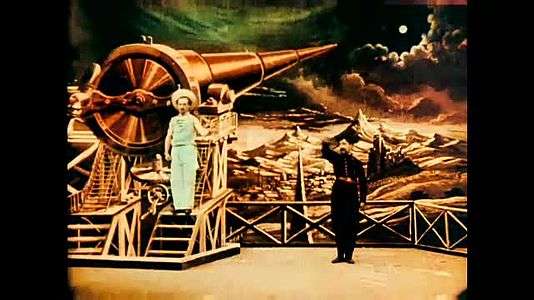French comedy films
French comedy films are comedy films produced in France. Comedy is also the most popular French genre in cinema.[1]
Comic films began to appear in significant numbers during the era of silent films, roughly 1895 to 1930. The visual humour of many of these silent films relied on slapstick and burlesque. A very early comedy short was Watering the Gardener (1895) by the Lumière brothers. In his native France and throughout the world, Max Linder was a major comic feature and might qualify as the first true film star.
Later, when the sound came in 1927,[N 1] Comedy films took another swing, due to laughter can now be caused not only by the burlesque situations, but also the dialogues.
Always a favorite of the public, as well as acclaimed, French cinema has many comedy films that are among the biggest box-office success in France. Some were the subject of remakes in other countries and have had great success worldwide, sometimes rewarded with prizes.
Characteristics of French comedy films
French comedy films are very often social comedies. That is a big difference compared to American comedies.[2]
| “ | Since Rabbi Jacob [...], the pattern of community comedy remained the same: a "foreign element" (potentially "disruptive") integrates (often against their will!) a community (ethnic, religious, geographical, etc.). Past the cultural shock and the inevitable mutual rejection phase, the protagonists inevitably realize that despite their differences (and before the end of the film), they are made for each other ... | ” | |
| — Xavier Beaunieux, Quoi info[3] | |||
A social comedy
The cultural shock, in several French comedy films are due to several 'clichés' which can be :
- religion (The Mad Adventures of Rabbi Jacob in the 1970s, and Serial (Bad) Weddings in the 2010s)
- social background (Life Is a Long Quiet River in the 1980s, and The Intouchables in the 2010s)
- difference of life between two places (Welcome to the Land of Shtis in the 2000s)
- difference of life between two periods of time (The Visitors and The Visitors II: The Corridors of Time in the 1990s)
- difference of life in a parallel world (Jean-Philippe in the 2000s)
The Social Comedy can be shown by a big contrast of personality between some people (French Fried Vacation and French Fried Vacation 2 in the 1970s, The Three Brothers in the 1990s, Hunting and Gathering in the 2000s)
Comedy duos
Some French Comedy films are based on Buddy film in which two people of the same sex and of different personality are put together.
| From the | Duos | Films |
|---|---|---|
| 1950s | Louis de Funès / Bourvil | Poisson d'avril, La Grande Vadrouille, Le Corniaud |
| Fernandel / Gino Cervi | serie of films Don Camillo. | |
| 1960s | Louis de Funès / Jean Marais | serie of films Fantômas. |
| Louis de Funès / Michel Galabru | serie of films Le Gendarme. | |
| 1970s | Gérard Depardieu / Patrick Dewaere | Les Valseuses. |
| Michel Serrault / Ugo Tognazzi | serie of films la Cage aux folles. | |
| 1980s | Duos with François Pignon and François Perrin | cf. Francois Pignon. |
| Philippe Noiret / Thierry Lhermitte | serie of films Les Ripoux. | |
| 1990s | Jean Reno / Christian Clavier | serie of films Les Visiteurs |
| Gérard Depardieu / Christian Clavier | Les Anges gardiens | |
| Samy Naceri / Frédéric Diefenthal | serie of films Taxi. | |
| 2000s | Kad Merad / Dany Boon | Bienvenue chez les Ch'tis, Supercondriaque |
| 2010s | François Cluzet / Omar Sy | The Intouchables |
Other characteristics
- French comedy film can be based on linguistic differences:
| “ | The things that make the French laugh involve linguistic somersaults that only work in their own language. Much of French humour is 'jeux de mots', untranslatable wordplays. | ” | |
| — The French have jokes, but do they have a sense of humour?, 20 décembre 2003, p. 75-76., The Economist[4] | |||
History
French comedy before cinema
In Europe, the theatrical genre like comedy developed in the Greco-Roman antiquity, which it shared with the tragedy theaters built in the Roman Empire. During the Middle Ages, the theater plays in the street, in the form of mystery plays, fabliaux, farces, soties and mimes. Some of these types are more or less inspired by antique survivals genres like Atellan.
In France in the 17th century under Louis XIV, the Italian influence and Molière are recognizing the comedy theater as an art in itself and not as a subgenre compared to the tragedy. From the 18th to the 19th century, comedy would go to incorporate opera and comédie-ballet to become opéra comique. Comedy would also go to create the Operetta (Offenbach) in the middle of the 19th century. In the beginning of the 20th century, operettas were transformed into musical theatre. Bourvil and Fernandel started as operetta singers ; Louis de Funès, started as a music-hall pianist.
Beginning of cinema
-

Pantomimes cartoons by Reynaud
-
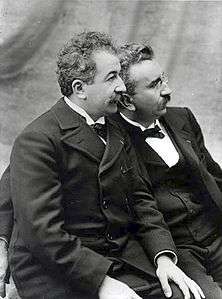
Fratelli Lumiere
-
Clip from the hand-colored version of A Trip to the Moon
In 1892, before cinema was created, Émile Reynaud realized several Comedy Cartoons : Le Clown et ses chiens ... Comic films began to appear in significant numbers during the era of silent films, roughly 1895 to 1930. The visual humour of many of these silent films relied on slapstick and burlesque. A very early comedy short was Watering the Gardener (1895) by the Lumière brothers. In his native France and throughout the world, Max Linder was a major comic feature and might qualify as the first true film star.
Georges Méliès, from theatre, created the first studio de cinéma. He also created a lot of silent comedies in which a lot will be destroyed later. He would have an homage in 2011 with the movie Hugo.
During the First World War, America would have the monopoly of Comedy Movies with the 'Silent film' (Charlie Chaplin, Laurel and Hardy...) It is after the coming of sound (The Jazz Singer was released in 1927 in US) that Comedy films would start being produced in France from the 1930s.
Sound film of Interwar period and during the Occupation
When the sound came in 1927, Comedy films took another swing, due to laughter can now be caused not only by the burlesque situations, but also the dialogues.
In the 1930s, French comedies talked about farmers and villages (as the majority of the populace was rural).
Le schpountz is a story of a man from little village, who is naive, and who wants to have the chance to be actor.
The Baker's Wife and The Well-Digger's Daughter are other movies, also based on a novel of Marcel Pagnol, which occurs in a little village.
The theme of countryside associated to medecine occurs in the film Dr. Knock of 1933, based on the novel Knock by Jules Romains. In this film, Louis Jouvet plays the character Dr. Knock ; later he played the same character in the famous movie Dr. Knock of 1951.
In A Cage of Nightingales of 1945, a teacher (Noël-Noël) has to face difficult teens. He decides to create a choral, and thus he improves the personality of the students. This masterpiece would have a famous remake in 2000 : 'Les Choristes'. And in a certain way, the movie Sister Act 2: Back in the Habit is influenced from this movie.
From the end of the war to 1970s : film shows the evolution of society
After the Second World War, French Society changed a lot from the 1940s to the 1970s (it was the Reconstruction Era, and Trente Glorieuses in France), so it had a big impact upon French Comedy Films of this period. A number of French comedians were able to find an English speaking audience in this period, including Fernandel, Bourvil, Louis de Funès and Jacques Tati.
Fernandel, after having played in Marcel Pagnol's movie (Topaze...), became Don Camillo in a lot of series of films. He is in a certain way a 'Franco-Provençal actor.'
Bourvil, diversified from Fernandel comedy and from 'Farmer comedy' (derived from trooper comedy) after being influenced from. He is also present in the genre of Swashbuckler film (with his roles in The Three Musketeers, The Hunchback and Captain Blood of 1960) to which he brings a humorous tone.
Bourvil formed a Comedy Duo with Louis de Funès in several movies: April Fools and then The Sucker, La Grande Vadrouille : "two road movie in the open air", with very great success. The Sucker is the "first film in French Cinema History to have reached 11 million tickets," and La Grande Vadrouille had remained the biggest French success for over 40 years.
Louis de Funès (which is needed at the right timing for movies that are colorising, because films are in competition with television in the 1960s), played with Jean Marais a series of films called 'Fantomas' (Fantomas, Fantomas Unleashed...) before being in duo with Michel Galabru in the series of films 'les gendarmes' (The Troops of St. Tropez ...) At this time, for at least 10 years, Louis de Funès monopolized the French Comedy films in cinema : annually at least 1 of the 10 biggest box office success in France was a Louis de Funès film.

Jacques Tati created his own style by playing with the burlesque, people's behaviour, and sound. It was a way for him to show the change of the society between the 1940s and 1960s : Jour de Fête in 1949 (life in a French village after the war), Les Vacances de monsieur Hulot en 1953 (new society in the 1950s during Sea Holliday), Mon oncle en 1958 (that showed the contrast between the traditional Paris that still existed at the beginning of the 1950s and a world which was changing), and Playtime in 1967 (that showed the new society which was coming in the 1970s). One of the biggest homages to Tati was the 2003 cartoon les Triplettes de Belleville.
In 1967, the film An idiot in Paris (with Jean Lefebvre, Dany Carrel and Bernard Blier) shows a certain nostalgia of rural society (whereas rural society transition to urban society has already been completed in the 1960s).
In the 1970s (which is the Golden Age of comedies of Louis de Funès), the change of society of the 1970s is shown.
For instance, the fact that kids want to have more power in the family (Let's Get Those English Girls), foods changes (The Wing or the Thigh), the transition to a leisure society (les gendarmes), problems related to pollution (The Spat), cultural shock due to the transformation of the countryside to city (Cabbage Soup)...
From the 1970s to 1990s
At the beginning of the 1970s, new actors from the "baby-boomer" generation starred in Comedy films :
Gérard Depardieu, the Splendid troupe, Daniel Auteuil, Daniel Prévost, Coluche...
In the late 1990s, 'The Visitors' and 'Taxi' were triumphs. Also, some new actors would become famous through the Internet; especially Les Inconnus, and also Jean Dujardin.
-
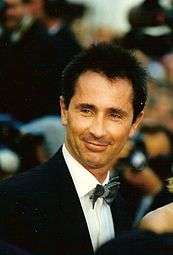
Thierry Lhermitte in 1998.
-
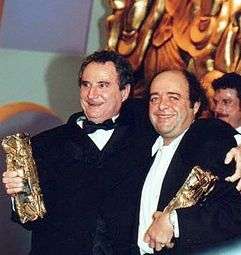
Daniel Prévost and Jacques Villeret in ceremony of Césars.
-

Depardieu with Carole Bouquet at the 2001 Cannes Film Festival.
-
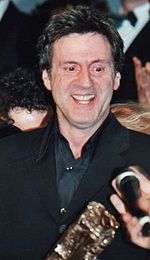
Daniel Auteuil in 2000.
Le Splendid
The 1970s to 1990s corresponds to the golden age of comedies created and played by le Splendid which has been very famous through the theatre.
This troupe has : Josiane Balasko, Michel Blanc, Marie-Anne Chazel, Christian Clavier, Gérard Jugnot, Thierry Lhermitte...
Among the most important success of le Splendid, there are : French Fried Vacation, French Fried Vacation 2, Santa Claus is a bastard...
Later, each member of the troupe star on their own, with the following successful movies.
Provocation comedy films in the 1970s and 1980s
These types of Comedy Movies appeared right after May 1968 events in France, in which the French Society was questioned, the 1970s comedy tackle new social phenomena and sometimes provoke or shock.
Indeed, in the early 1970s, the French comedy - in crisis for several reasons - must reinvents by itself:
| “ | In the 1970s, "French comedy" style begins to choke (in any case to bring less money, as the market is saturated: the genre is criticized by the New Wave, May 68 has been there, and American films begin to break the market in France). This kind of film is no longer a success from the late 70's and the social claim a little naughty tend to replace the face of the 60s films. In 1970s appears celebrities roles more "hard" like Dewaere Patrick, Gerard Depardieu, Bernard-Pierre Donnadieu or Alain Delon (period "Delon super cop") which collect the dividends of popular cinema, exhausted by poor easy comedies on the one hand, and the pretentious New Wave intellectualism on the other hand. | ” | |
| — nanarland.com, Jean Lefebre | |||
There are provocations in several films post May 68 like Going Places, La Grande Bouffe, Les Babas Cool, Menage... For example, in Santa Claus is a bastard, Santa Claus (who is traditionally supposed to be calm) is totally violent, vulgar, rude and brandishes a gun. In its entirety, the film addresses very controversial subjects in the 1980s: suicide, homosexuality and transvestites (by the character played by Christian Clavier), violence, poverty and loneliness. "The comedy arises from the incompatibility between the connotations of the costume - the party, childhood, gifts - and the character of Santa Claus who is violent and unscrupulous.[5]"
'Francois Pignon' concept (movies from the 1980s to the 2000s)
It is basis of the concept of 'Francois Pignon' and 'Francois Perrin' by Francis Veber, which symbolize the 'stupid' and 'naive' guy who is lucky and who - despite these weaknesses - stands up to difficulties, compared to the 'strong' and 'smart' guy who loses.
- in the 1980s, there is the duo Gérard Depardieu/Pierre Richard (Knock on Wood, ComDads, Les Fugitifs...) with Pierre Richard as 'Francois Pignon' and 'Francois Perrin'.
- in the 1990s, there is the duo Thierry Lhermite/Jacques Villeret (Le Dîner de cons) with Jacques Villeret as 'Francois Pignon'
- in the 2000s, there is the duo Gérard Depardieu/Daniel Auteuil (The Closet) with Daniel Auteuil as 'Francois Pignon' ;
and there is the duo Daniel Auteuil/Gad Elmaleh (The Valet) with Gad Elmaleh as 'Francois Pignon'
Apparition of series of films in the 1990s
From the 1990s, several series of films have a good rank in box-office:
- Les Visiteurs (Christian Clavier, Jean Reno)
- Taxi (Frédéric Diefenthal)
- La vérité si je mens (Richard Anconina, José Garcia)
- Les Randonneurs (Benoît Poelvoorde)
- Astérix (Gérard Depardieu)
And new actors become famous by TV and internet (Les Nuls, Les Inconnus, and Jean Dujardin with his character of Brice de Nice).
- Les Inconnus produced Les Trois Frères and The Bet in the 1990s, Les Rois mages and Madame Irma in the 2000s.
- Les Nuls produced La Cité de la peur and Didier in the 1990s, Asterix & Obelix: Mission Cleopatra and RRRrrrr!!! in the 2000s.
- Jean Dujardin, after being famous on the internet, went on to TV (Un gars, une fille) and then on to cinema at the beginning of 2000s (If I Were a Rich Man...)
The 2000s, the transition
The 2000s correspond to a transition: indeed, the Splendid troupe generation of the 1970s tends to give over to newcomers (Dany Boon, Jamel Debbouze, Omar Sy) who have become famous with 'one man shows'.
-

Jamel Debbouze in Cannes Festival in 2010.
-
Dany Boon as Postman.
-

Audrey Tautou in Cannes Festival in 2013.
The Asterix & Obelix: Mission Cleopatra film - who unified the two generations of actors - went to the box office.
Amélie in 2001, and The Chorus in 2004, belong to the list of French submission for Academy Award for Best Foreign Language Film.
Old generation of actors
The generation which have a long experience in film comedies (which started for most of them in the 1970s)
Francis Veber would realize new movies based on 'François Pignon' : The Valet and The Closet.
Evolution of personality of some characters
- The character of Daniel Auteuil would become more developed : from cunning in the 1970s, 1980s and 1990s (The Under-Gifted, Pour cent briques, t'as plus rien..., On Guard), it would develop to be sad and more sensible in the 2000s (The Closet, The Valet, My Best Friend). In "The Closet", he was named Best Actor at the 'Shanghai International Film Festival'.
- The character of Michel Blanc, which came from the character of 'Jean-Claude Dusse' in 'French Fried Vacation' went from 'loser' and 'unlucky' in the 1970s and 1980s (French Fried Vacation, French Fried Vacation 2, Viens chez moi, j'habite chez une copine, Menage ...), to 'romantic' (You Are So Beautiful ...) in the 2000s. In "You Are So Beautiful", he was nominated as Best Actor for the César Award.
- The character of Gérard Jugnot, went from choleric (Bernard Morin in French Fried Vacation and French Fried Vacation 2) and violent (Félix in Santa Claus is a bastard, Ramirez in Papy fait de la résistance) in the 1970s and 1980s, to calm in the 2000s (Monsieur Batignole, The Chorus, Le Petit Nicolas.) The movie The Chorus in which he is teacher will be a triumph all around the world in 2005.
- The character of Daniel Prévost match the cunning - even the scammer - whatever the business in which he works (1990s : The Dinner Game as tax inspector, Asterix & Obelix Take On Caesar as false prophet ; 2000s : A Crime in Paradise as lawyer and The House of Happiness as real estate agent.) For the great interpretation of the tax inspector in "The Dinner Game", he received the Cesar for Best Supporting Actor in 1998.
New generation of actors
The movies Podium and Welcome to the Land of Shtis are very popular.
The same for the Romantic Comedies 'Amélie', 'Priceless' and 'Hunting and Gathering' with Audrey Tautou.
From the 2010s
The movies The Intouchables and Serial (Bad) Weddings have very big success.
Jean Dujardin wins the Oscar award of the Best Actor for The Artist, and Omar Sy wins the César award of the Best Actor in 2012 for The Intouchables.
-
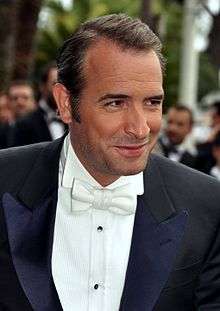
Jean Dujardin in Cannes Festival in 2011.
-

Omar Sy during 'Prix Lumières' festival in 2012.
Lists of notable films
Lists of highest-grossing films in France
From The 100 highest-grossing French films of all time in France, in 2014, the rank is:
| Rank | Title | Producer | Year | Box-office[6] | Country[N 2] |
|---|---|---|---|---|---|
| 1 | Bienvenue chez les Ch'tis | Dany Boon | 2008 | 20,489,303 | |
| 2 | The Intouchables | E. Toledano / O. Nakache | 2011 | 19,440,920 | |
| 3 | La Grande Vadrouille | Gérard Oury | 1966 | 17,267,607 | |
| 4 | Asterix & Obelix: Mission Cleopatra | Alain Chabat | 2002 | 14,559,509 | |
| 5 | Les Visiteurs | Jean-Marie Poiré | 1993 | 13,782,991 | |
| 6 | Le Petit Monde de Don Camillo | Julien Duvivier | 1952 | 12,791,168 | |
| 7 | Qu'est-ce qu'on a fait au Bon Dieu ? | Philippe de Chauveron | 2014 | 12,237,274 | |
| 8 | Le Corniaud | Gérard Oury | 1965 | 11,739,783 | |
| 9 | Les Bronzés 3: Amis pour la vie | Patrice Leconte | 2006 | 10,355,928 | |
| 10 | Taxi 2 | Gérard Krawczyk | 2000 | 10,345,901 | |
We can notice that before Bienvenue chez les Ch'tis was released in 2008, La Grande Vadrouille had stayed the highest-grossing films in France for 42 years, that is a very good result for a movie.
Lists of remakes in foreign countries
Many French comedies were taken abroad as a remake, particularly in USA.
| French film | Year | Foreign film | Country and year of the foreign film |
|---|---|---|---|
| Bienvenue chez les Ch'tis | 2008 | Benvenuti al Sud | |
| Le Dîner de cons | 1998 | The Dinner Game | |
| Taxi | 1998 | New York Taxi | |
| Les Visiteurs | 1993 | Les Visiteurs en Amérique | |
| La Totale ! | 1991 | True Lies | |
| Trois hommes et un couffin | 1985 | Three Men and a Baby | |
| Trois hommes et un couffin | 1985 | Heyy Babyy | |
| Un indien dans la ville | 1994 | Jungle 2 Jungle | |
| Le Père Noël est une ordure | 1979 | Mixed Nuts | |
| Le Jouet | 1976 | The Toy | |
| Oscar | 1967 | Oscar | |
| L'Amour l'après-midi | 1972 | I Think I Love My Wife | |
| Boudu sauvé des eaux | 1932 | Down and Out in Beverly Hills | |
| Fanny | 1932 | Fanny | |
French comedy film, remake of American movie is almost non-existent. There is only the movie Jo by Jean Girault from the movie The Gazebo by George Marshall, in which Louis de Funès plays the role of Glenn Ford.
Notes and references
References
- ↑ Powrie, P. (1997). French Cinema in the 1980s: Nostalgia and the Crisis of Masculinity. Oxford: Clarendon Press. p. 141.
It's no exaggeration to say that comic films are the most popular French genre
- ↑ "La comédie française se différencie [...] par son aspect social, une lutte des classes généralement absente des comédies américaines." (French) "Les Américains et l'humour français sont-ils incompatibles ?"..
- ↑ "(French) "La vérité ! Comment réussir sa comédie communautaire ?"..
- ↑ (French) "The French have jokes, but do they have a sense of humour?"..
- ↑ "À se tordre de rire : la représentation du corps dans les films comiques américains et français". by Lauretta Clough and Caroline Eades (in recherchestravaux.revues.org)
- ↑ Following CNC on JP's Box-Office
Notes
- ↑ The first French non silent movie, Les Trois Masques by André Hugon, was released in Paris on 31 October 1929.
- ↑ On the right the foreign partner of French production.
| ||||||||||||||||||||||||||||||||
